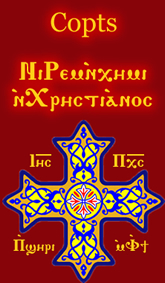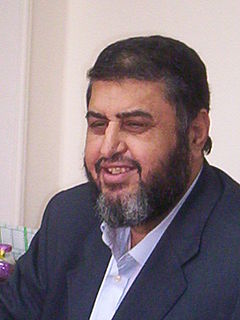
The Coptic Orthodox Church of Alexandria is an Oriental Orthodox Christian church based in Egypt, Africa and the Middle East. The head of the Church and the See of Alexandria is the Patriarch of Alexandria on the Holy See of Saint Mark, who also carries the title of Coptic Pope. The See of Alexandria is titular, and today the Coptic Pope presides from Saint Mark's Coptic Orthodox Cathedral in the Abbassia District in Cairo. The church follows the Alexandrian Rite for its liturgy, prayer and devotional patrimony. With 20–25 million members worldwide, whereof about 18 to 22 million are in Egypt, it is the country's largest Christian church.
Mahmoud Fahmy Elnokrashy Pasha was an Egyptian political figure. He was the second prime minister of the Kingdom of Egypt.
The Muslim Brotherhood is an Islamic organization that was founded in Ismailia, Egypt by Hassan al-Banna in March 1928 as an Islamist religious, political, and social movement. The group spread to other Muslim countries but has its largest, or one of its largest, organizations in Egypt, where for many years it has been the largest, best-organized, and most disciplined political opposition force, despite a succession of government crackdowns in 1948, 1954, 1965 after plots, or alleged plots, of assassination and overthrow were uncovered. Following the 2011 Revolution the group was legalized, and in April 2011 it launched a civic political party called the Freedom and Justice Party (Egypt) to contest elections, including the 2012 presidential election when its candidate Mohamed Morsi became Egypt's first democratically elected president. One year later, however, following massive demonstrations, Morsi was overthrown by the military and arrested. As of 2014, the organization has been declared a terrorist group by Russia, Egypt, UAE, Saudi Arabia and is once again suffering a severe crackdown.

Christianity is second largest religion in Egypt. The number of Egyptian Christians, nearly all of whom are Coptic Christians, is uncertain; estimates range from 15% to 20% of the population. While a minority within Egypt, Egypt's Christian population is the largest in absolute numbers in the Middle East and North Africa. The history of Christianity in Egypt dates to the Roman era as Alexandria was an early center of Christianity.

Copts are native Egyptian Christians, usually Oriental Orthodox, who currently make up between 10 and 15%</ref> of the population of Egypt — the largest religious minority of that country. While Copts have cited instances of persecution throughout their history, Human Rights Watch has noted "growing religious intolerance" and sectarian violence against Coptic Christians in recent years, and a failure by the Egyptian government to effectively investigate properly and prosecute those responsible. Since 2011 hundreds of Egyptian Copts have been killed in sectarian clashes, and many homes and businesses have been destroyed. In just one province (Minya), 77 cases of sectarian attacks on Copts between 2011 and 2016 have been documented by the Egyptian Initiative for Personal Rights. The abduction and disappearance of Coptic Christian women and girls also remains a serious ongoing problem.

Mohammed Badie is the eighth Supreme Guide of the Muslim Brotherhood. He has headed the Egyptian branch of the international Muslim Brotherhood organization since 2010. Before becoming general guide, Badie had been a member of the group's governing council, the Guidance Bureau, since 1996. He was arrested by Egyptian authorities on 20 August 2013. On 28 April 2014, after an eight-minute trial in which Badie could not present his defence, he was sentenced to death, along with 682 others who are allegedly Muslim Brotherhood supporters. He was sentenced to life in prison on 15 September 2014, and was sentenced to death on 11 April 2015, along with thirteen other senior Muslim Brotherhood members. He received a sixth life sentence on 22 August 2015 and a seventh on 8 May 2017.

In Egypt, the Muslim Brotherhood – a Sunni Islamist religious, political, and social movement – is, or was, considered the largest, best-organized political force in Egypt, with adherents estimated to number between 2 and 2.5 million. Founded in Egypt by Hassan al-Banna in March 1928, the group spread to other Muslim countries but has its largest, or one of its largest, organizations in Egypt, despite a succession of government crackdowns in 1948, 1954, 1965, and 2013 after plots, or alleged plots, of assassination and overthrow were uncovered.

Sidi Bishr is a neighborhood in the Montaza District of Alexandria, Egypt. Established as a summering site by the Egyptian middle class before the Revolution of 1952, it has since become one of the largest neighborhoods of the city.

The Egyptian Crisis began with the Egyptian revolution of 2011, when hundreds of thousands of Egyptians took to the streets in an ideologically and socially diverse mass protest movement that ultimately forced longtime president Hosni Mubarak from office. A protracted political crisis ensued, with the Supreme Council of the Armed Forces taking control of the country until a series of popular elections brought the Muslim Brotherhood to power. However, disputes between elected Islamist president Mohamed Morsi and secularists continued until the anti-government protests in June 2013 that led to the overthrow of Morsi in 2013, in what has been variably described as a coup d'état or as an ending to the second revolution, or both. Abdel Fattah el-Sisi, who announced the overthrow of Morsi, then became the leader of Egypt the following year, winning election to the presidency in a landslide victory described by EU observers as free but not necessarily fair. Nonetheless, Sisi's election was widely recognized, and the political situation has largely stabilized since he officially took power; however, some protests have continued despite a government crackdown. The crisis has also spawned an ongoing insurgency led by Ansar Bait al-Maqdis in the Sinai Peninsula, which became increasingly intertwined with the regional conflict against the Islamic State of Iraq and the Levant later in 2014.

Dr. Abdel Moneim Aboul Fotouh Abdel Hady is an Egyptian physician, former student activist and Islamist politician. In 2011–2012, he ran for President of Egypt as an independent. He was formerly a leader of the Muslim Brotherhood.

Dr. Essam Mohamed Hussein el-Erian is an Egyptian physician and politician. He is the vice chairman of the Freedom And Justice party. Formerly he was a member of the Guidance Bureau of the Muslim Brotherhood. He was elected as a parliament member in the 2011-2012 Egyptian parliamentary elections. After the 2013 Egyptian coup, prosecutors ordered his arrest on 10 July 2013. On 14 July 2013 Egypt's new prosecutor general Hisham Barakat ordered his assets to be frozen. el-Erian was arrested by the government on 30 October 2013.

Mohamed Saad Tawfik El-Katatni is an Egyptian Islamist politician who has been the chairman of the Freedom and Justice Party (FJP) since October 2012. From January 2012 until its dissolution in September he was the first Speaker of the People's Assembly after the Egyptian Revolution of 2011. Prior to this, he served as the first secretary-general of the FJP and was a member of the Guidance Bureau of the Muslim Brotherhood.

Mohammed Khairat Saad el-Shater is an Egyptian engineer, businessman and Islamist political activist. A leading member of the Muslim Brotherhood, as the Deputy Supreme Guide, el-Shater was the initial candidate of the movement's Freedom and Justice Party during the 2012 Egyptian presidential election before being disqualified by the election commission. Previously, he was the deputy chairman of the Brotherhood.

The Strong Egypt Party is an Egyptian centrist political party founded in 2012 by former presidential candidate Abdel Moneim Aboul Fotouh.

The following chronological summary of major events took place during the 2011 Egyptian revolution right up to Hosni Mubarak's resignation as the fourth President of Egypt on 11 February 2011.
The Pioneer Party, also known as the Leadership Party, is a civil political party in Egypt. The party was founded by former members of the Muslim Brotherhood. The party has decided to exclude former members of the National Democratic Party. The party joined in a coalition with the Wasat Party in Alexandria during the parliamentary elections held in 2011 and 2012.

The Freedom and Justice Party (FJP) is an Egyptian Islamist political party. The ex-president of the party, Mohamed Morsi, won the 2012 presidential election, and in the 2011 parliamentary election it won more seats than any other party. It is nominally independent, but has strong links to the Muslim Brotherhood of Egypt, the largest political group in Egypt. The party was banned and dissolved in 2014; however, it continues to function underground.
Gehad El-Haddad is an Egyptian political activist for the Muslim Brotherhood. He acted as media spokesman for the Brotherhood from May 2013 until he was arrested on September 17, 2013.















